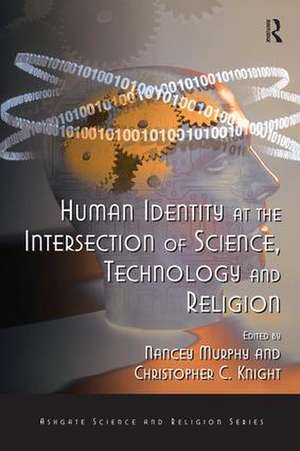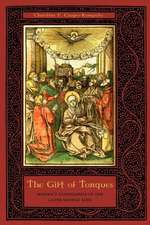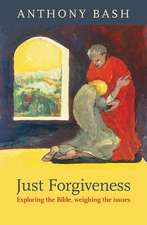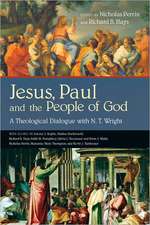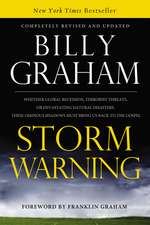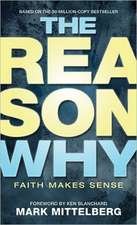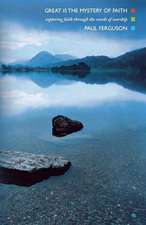Human Identity at the Intersection of Science, Technology and Religion: Routledge Science and Religion Series
Autor Christopher C. Knight Editat de Nancey Murphyen Limba Engleză Hardback – 18 oct 2010
| Toate formatele și edițiile | Preț | Express |
|---|---|---|
| Paperback (1) | 485.99 lei 6-8 săpt. | |
| Taylor & Francis – 23 noi 2016 | 485.99 lei 6-8 săpt. | |
| Hardback (1) | 1112.03 lei 6-8 săpt. | |
| Taylor & Francis – 18 oct 2010 | 1112.03 lei 6-8 săpt. |
Din seria Routledge Science and Religion Series
-
 Preț: 340.24 lei
Preț: 340.24 lei -
 Preț: 309.89 lei
Preț: 309.89 lei -
 Preț: 319.08 lei
Preț: 319.08 lei -
 Preț: 317.81 lei
Preț: 317.81 lei -
 Preț: 319.94 lei
Preț: 319.94 lei -
 Preț: 309.59 lei
Preț: 309.59 lei - 16%
 Preț: 301.41 lei
Preț: 301.41 lei - 18%
 Preț: 1002.50 lei
Preț: 1002.50 lei -
 Preț: 381.00 lei
Preț: 381.00 lei -
 Preț: 436.14 lei
Preț: 436.14 lei -
 Preț: 432.12 lei
Preț: 432.12 lei - 18%
 Preț: 898.49 lei
Preț: 898.49 lei -
 Preț: 469.34 lei
Preț: 469.34 lei -
 Preț: 384.44 lei
Preț: 384.44 lei -
 Preț: 386.39 lei
Preț: 386.39 lei -
 Preț: 476.86 lei
Preț: 476.86 lei -
 Preț: 444.62 lei
Preț: 444.62 lei -
 Preț: 384.02 lei
Preț: 384.02 lei - 18%
 Preț: 1059.45 lei
Preț: 1059.45 lei - 17%
 Preț: 259.98 lei
Preț: 259.98 lei - 18%
 Preț: 1054.71 lei
Preț: 1054.71 lei - 13%
 Preț: 338.33 lei
Preț: 338.33 lei -
 Preț: 441.20 lei
Preț: 441.20 lei -
 Preț: 469.34 lei
Preț: 469.34 lei - 18%
 Preț: 1059.45 lei
Preț: 1059.45 lei - 25%
 Preț: 770.98 lei
Preț: 770.98 lei - 18%
 Preț: 1113.16 lei
Preț: 1113.16 lei -
 Preț: 380.07 lei
Preț: 380.07 lei -
 Preț: 489.26 lei
Preț: 489.26 lei - 18%
 Preț: 1061.93 lei
Preț: 1061.93 lei - 18%
 Preț: 998.08 lei
Preț: 998.08 lei - 18%
 Preț: 891.85 lei
Preț: 891.85 lei - 18%
 Preț: 1054.71 lei
Preț: 1054.71 lei
Preț: 1112.03 lei
Preț vechi: 1356.14 lei
-18% Nou
Puncte Express: 1668
Preț estimativ în valută:
212.82€ • 221.36$ • 175.69£
212.82€ • 221.36$ • 175.69£
Carte tipărită la comandă
Livrare economică 14-28 aprilie
Preluare comenzi: 021 569.72.76
Specificații
ISBN-13: 9781409410508
ISBN-10: 1409410501
Pagini: 254
Dimensiuni: 156 x 234 mm
Greutate: 0.54 kg
Ediția:1
Editura: Taylor & Francis
Colecția Routledge
Seria Routledge Science and Religion Series
Locul publicării:Oxford, United Kingdom
ISBN-10: 1409410501
Pagini: 254
Dimensiuni: 156 x 234 mm
Greutate: 0.54 kg
Ediția:1
Editura: Taylor & Francis
Colecția Routledge
Seria Routledge Science and Religion Series
Locul publicării:Oxford, United Kingdom
Notă biografică
Nancey Murphy is Professor of Philosophy at Fuller Theological Seminary, Pasadena, CA, USA; Christopher C. Knight is Executive Secretary of the International Society for Science and Religion based at Benet House, St. Edmund's College, Cambridge, UK.
Recenzii
'This is a serious and stimulating collection asking what it is to have a religious understanding of what it is to be a human in the light of modern science. I am sure that it will be of help to students and scholars alike, and will rightfully take its place on the front shelves of discussions of the relationship between science and religion.' Michael Ruse, Florida State University, USA '...anthology of profound reflections...Highly recommended. All academic, general, and professional readers.' Choice 'Taken together with recent developments in neuroscience, genetics, artificial intelligence and biomedical engineering it becomes clear that the question of Human Identity at the Intersection of Science, Technology and Religion is an urgent one. ... [This] book is well written and a very interesting reflection upon human self-conceptions.' ESSSAT News
Cuprins
Preface; Introduction, Nancey Murphy; Part 1 The Limits of Religion, the Limits of Science; Chapter 1 Homo Religiosus A Theological Proposal for a Scientific and Pluralistic Age, Christopher C. Knight; Chapter 2 Religious Symbolism Engaging the Limits of Human Identification, F. LeRon Shults; Chapter 3 Fundamentalism in Science, Theology, and the Academy, George F. R. Ellis; Part 2 The Emergence of the Distinctively Human; Chapter 4 Reductionism and Emergence A Critical Perspective, Nancey Murphy; Chapter 5 Nonreductive Human Uniqueness Immaterial,Human and Artificial Intelligence A Theological Response, Noreen Herzfeld; Chapter 7 The Emergence of Morality, James W. Haag; Part 3 The Future of Human Identity; Chapter 8 What Does It Mean to Be Human? Genetics and Human Identity, Martinez Hewlett; Chapter 9 Distributed Identity, Wesley J. Wildman; Chapter 10 Without a Horse, Noah Efron; Chapter 11 From Human to Posthuman Theology and Technology, Brent Waters; Chapter 12 Can We Enhance the Imago Dei?, Ted Peters;
Descriere
Ideas of human nature in the West have always been shaped by the interplay of philosophy, theology, science, and technology. The fast pace of developments in the latter two spheres (neuroscience, genetics, artificial intelligence, biomedical engineering) call for fresh reflections on what it means, now, to be human, and for theological and ethical judgments on how we might shape our own destiny in the future. The leading scholars in this book offer fresh contributions to the lively quest for an account of ourselves that does justice to current developments in theology, science, technology, and philosophy.
